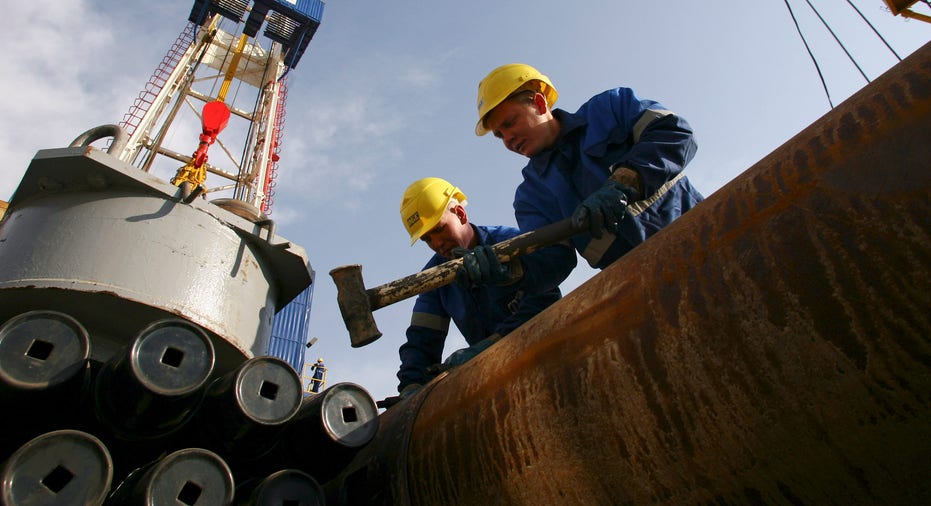Oil Prices Climb Higher as Iran Tension Builds, Dollar Weakens

Brent rose to a nine-month high above $124 per barrel on Thursday as heightened tension between Iran and the West and a weaker dollar offset concerns that a slowdown in the global economy would curb demand.
U.N. inspectors sent to visit Iran's nuclear installations declared their mission a failure, a setback likely to increase the risk of confrontation with the West.
Brent crude for April delivery was up $1.27 at $124.17 by 1138 GMT, having touched an intraday peak of $124.48 per barrel, the highest since early in May 2011.
U.S. crude futures for April were 13 cents firmer at $106.41 after settling at a nine-month high of $106.28 a barrel the previous day.
The dollar index fell by 0.5 percent as the euro rallied following an improved reading of German business confidence in addition to political concerns, although worries about Greece are likely to cap the fall.
A weaker greenback renders dollar-denominated commodities such as crude oil cheaper for other currency holders.
Fears of an escalation of tension with Iran led prices higher. Political jitters and production glitches in Iran, the North Sea, South Sudan, Syria and Yemen have tightened supplies since the start of the year, lifting front-month Brent futures by more than 10 percent.
"It is the Iran conflict that is causing prices to skyrocket," Commerzbank oil analysts wrote in a note.
"For as long as the oil price continues to rise, Iran is likely to compensate for its reduced sales volume by charging a higher price and cannot be expected to make any concessions in the nuclear dispute in the near future. At the same time, the risks to the global economy are growing, so discussions about releasing strategic oil reserves are likely if prices keep climbing."
India has sought an additional 100,000 barrels per day (bpd) from Saudi Arabia, the world's biggest oil producer, for 2012/13, India's junior oil minister said on Thursday, which is seen as a move to replace Iranian supplies.
Japan could cut Iranian imports by 20 percent or more this year, a Japanese newspaper reported, following reductions planned by other buyers in Asia and Europe as Western sanctions made trade difficult.
"With extremely limited buffers to absorb any one of the series of potential geopolitical mishaps, the backdrop of the oil market is getting uneasy, and maintaining a deep short position would not be wise, in our view," Barclays analysts warned.
Iraq lived through one of its bloodiest days since U.S. troops pulled out in mid-December when a string of early morning attacks on most Shi'ite targets across the country killed at least 60 and wounded dozens, raising the spectre of widespread sectarian violence.
Amid worries about crude availability and high oil prices, all eyes are on the inventory report to be released by the U.S. Energy Information Administration at 1600 GMT.
Data from the American Petroleum Institute on Wednesday showed crude stockpiles rose by 3.6 million barrels in the week to Feb. 17, well in excess of analysts' expectations for a 500,000 barrel build.
PRICES IN FOCUS
Skyrocketing U.S. gasoline prices have become an issue for the 2012 presidential election season. Three Democratic lawmakers on Wednesday urged the White House to signal it is ready to tap the nation's oil stockpiles.
Goldman Sachs expects the spread between September U.S. crude and Brent futures to narrow to $5 a barrel in six months following the scheduled June reversal of the Seaway pipeline to carry crude oil from Cushing, Oklahoma to the U.S. Gulf Coast.
The bank predicted further upside in Brent crude this year but said that with prices currently above its three-month target of $120 per barrel, the U.S. benchmark offers better trading opportunities from June onwards.
The front-month Brent crude premium against U.S. crude <CL-LCO1=R> narrowed to around $17.70 by 1123 GMT from close to $21 on Feb. 7 as inventories rose at Cushing, the delivery point for West Texas Intermediate crude. (Reporting by Zaida Espana in London and Florence Tan in Singapore; editing by Jane Baird)



















